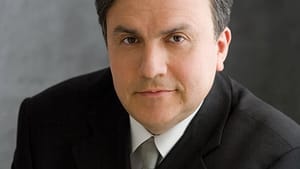Stay in the Loop
BSR publishes on a weekly schedule, with an email newsletter every Wednesday and Thursday morning. There’s no paywall, and subscribing is always free.
Bronfman's brilliant Beethoven
Philadelphia Orchestra's 'British Isles Festival, Week Three: Haydn and Beethoven' (second review)

It was the best of times, it was the worst of times for the Philadelphia Orchestra last weekend as guest conductor Fabio Luisi presented a program of Haydn, Beethoven, and Wagner.
It was the best when Yefim Bronfman, who often solos with the Philadelphians, presented an inspired reading of Beethoven’s Piano Concerto No. 3 in C minor. This is a profound work that reflects Beethoven’s agony and ecstasy as he raged against the enveloping specter of deafness and envisioned an uncharted path toward greatness. He already had 11 piano sonatas, including the Pathetique, under his belt as he undertook the Third Concerto, and knew and deployed every technique he had developed by that time for enrobing his most passionate feelings in the cloak of reason and artistry.
Bronfman is the perfect pianist to perform Beethoven at this point in the composer’s career. In sync with Luisi’s well-paced tempo, he brought gravitas and command without being domineering. The music seemed to flow from Bronfman’s brain into steady, supple fingertips that released the composer’s complex intentions with ease and regularity.
I have never heard the cadenza rendered more beautifully, with exactly the right mix of virtuosity, intimate reflection, and pyrotechnics. The entire first movement was a tribute to Beethoven and a gift to us, his listeners.
The second movement, while insightful and well performed, was slightly too languid, Beethoven on Valium, if you like. But the work reenergized in the concluding Rondo Allegro-Presto under Bronfman’s touch.
This movement uses one of Beethoven’s signature tricks, storming along in minor, then suddenly shifting gears into major, like sunshine piercing through clouds on a rainy day. Orchestra and soloist revealed the determination and faith that carried the composer through terror and into the realm of hope.
After several curtain calls and a standing ovation, Bronfman played Chopin’s Etude Op. 10, No. 3, perhaps a tad shy of technical perfection in the matinee performance, but crafting an all-enveloping web of beautiful sound nonetheless.
British invasion
The program opened with Haydn’s Symphony No. 104, the “London,” marking the last of three weeks of British-themed concerts. The full orchestra, unlike the smaller ensembles of Haydn’s day, gave a rich, imperious voice to the composer’s final declaration in symphonic form.
This is a work of enticing complexity, laden with lovely tunes, its motives and harmonic variety neatly etched by Luisi’s baton. The former Met conductor makes an appealing presence at the podium, elegant, with precise movements from the arms, shoulders, and expressive hands.
At the third movement, though, the mix of imagination and majesty collapsed with the introduction of a fast, aggressive pace, rendering the themes into an unintelligible jumble. This persisted in the fourth movement, ripping through the familiar melodies so fast they were barely discernible, wrecking for me a performance of a great work started with so much promise.
Love and passion
The program’s final work was Wagner’s voluptuous Prelude and “Liebestod” (“Love-death”) from Tristan and Isolde. Luisi coaxed the first stirrings of yearning from the cellos and built the piece masterfully as the prelude morphed into a cry of passion intermingled with despair.
Wagner builds layer over layer of melodic line, increasing in dynamic intensity until we wonder which will burst first, the orchestra or listeners’ hearts. The composition moves tentatively forward, as though unsure whether to pounce on the object of desire or to retreat into safety, finally collapsing in surrender, the ultimate Romantic excess.
Well done by Luisi and the orchestra, concluding a spellbinding program of extremes. Even the concert's negative elements offered a stimulating antidote for the mundane and tedious.
To read Cameron Kelsall's review, click here.
What, When, Where
British Isles Festival, Week Three: Haydn and Beethoven. Fabio Luisi, conductor; Yefim Bronfman, piano. Franz Joseph Haydn, Symphony No. 104 in D Major (“London”); Ludwig van Beethoven, Piano Concerto No. 3 in C Minor, Op. 37; Richard Wagner, Prelude and “Liebestod” from Tristan und Isolde. Philadelphia Orchestra. January 24-26, 2018, at the Kimmel Center’s Verizon Hall, 300 S. Broad Street, Philadelphia. (215) 893-1999 or philorch.org.
Sign up for our newsletter
All of the week's new articles, all in one place. Sign up for the free weekly BSR newsletters, and don't miss a conversation.
 Linda Holt
Linda Holt